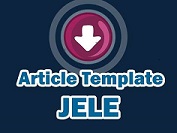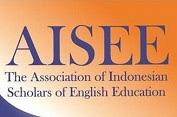A Learning Model for Reflective Micro-Teaching in A Hybrid EFL Classroom: Need Analysis
DOI:
https://doi.org/10.36706/jele.v11i1.37Keywords:
learning model, reflective micro-teaching, google classroomAbstract
It is essential for graduates of education study program to possess
proficient pedagogical skills. This is an important skill for prospective teachers
in meeting the demands of the 21st-century learning, where technology has
become an instrument that is used on a daily basis in the field of education as
well as in the field of industry. Therefore, this study responded to the need for a
program that develops a reflective learning model to offer pedagogical
improvement for prospective teachers in dealing with technological devices in a
hybrid micro-teaching classroom. A qualitative study was conducted through
questionnaires and interviews to find out students’ and lecturers’ perspectives
on whether a reflective micro-teaching model in a hybrid EFL classroom should
be developed. The participants of this study were 57 seventh-semester EFL who
had taken the Micro-Teaching subject and 4 lecturers who taught the subject.
Data analysis was carried out by calculating the average response scores from
the questionnaires and conducting thematic analysis on the interview data. The
findings indicated that reflective micro-teaching should be implemented in a
hybrid EFL classroom, as perceived by both lecturers and
prospective instructors.
References
Agustin, A. (2017). The Analysis of English Language Education Students’ Teaching Skills During Microteaching: Product-Process Approach in Teaching Grammar. Scholaria: Jurnal Pendidikan Dan Kebudayaan, 7(3), 251–256. https://doi.org/10.24246/j.scholaria.2017.v7.i3.p251-256
Brookfield, S.D. (2017). Becoming a Critically Reflective Teacher. 2nd Edition. San Fransisco, CA: Jossey Bass.
Carneige, D. (2022). Hybrid Learning and Blended Learning. Diunduh 7 Juni 2023 dari laman https://www.dalecarnegie.id/sumberdaya/artikel/articles/hybrid-learning-dan-blended-learning/
Fergusson, L., Lan, L.V.D., & Baker, S. (2019). Reflective Practice and Work-Based Research: A Description of Micro- and Macro-Reflective Cycles. Reflective Practice, DOI: 10.1080/14623943.2019.1591945.
Firdaus, A., & Astutik, Y. (2021). The Implementation of Blended Learning in Teaching English at Senior High School in Sidoarjo. New Language Dimensions, 2(2), 70-78.
Gerstein, J. (2014). Moving from Education 1.0 through Education 2.0 towards Education 3.0. Boise State University ScholarWorks, Hal. 83-89.
Hidayah, S.N. (2019). Hybrid Model-Based Learning in Welcome Era Industrial Revolution 4.0. The Innovation of Social Studies Journal, 1(1), 46-54.
Indra, A.N. (2010). Pembelajaran Hibrida sebagai Strategi Model Pembelajaran Masa Depan. DOI:10.17933/MTI.V1|2.10.
Kimaro, A. R., Mhagama, M., & Onyango, D. (2021). The Influence of Micro-Teaching in Enhancing Teaching Competences of Pre-Service Teachers: A Case of Saint Augustine University of Tanzania. East African Journal of Education and Social Sciences (EAJESS), 2(1), 11-22.
Lestari, Syafril, S., Latifah, S., Engkizar, E., Damri, D., Asril. Z., & Yaumas, N.E. (2020). Hybrid Learning on Problem-Solving Abilities in Physics Learning: A Literature Review. Journal of Physics: Conference Series Young Scholar Symposium on Science Education and Environment (YSSSEE). Doi:10.1088/1742-6596/1796/1/012021.
Peraturan Menteri Riset, Teknologi, dan Pendidikan Tinggi Nomor 55 Tahun 2017 tentang standar pendidikan guru nasional.
Rao, V.C.S. (2019). Blended Learning: A New Hybrid Teaching Methodology. Journal for Research Scholars and Profesionals of English Language Teaching, 13(3).
Riyanda, A.R., Agnesa, T., Wira, A., Ambiyar, Umar, S., & Hakim, U. (2022). Hybrid Learning: Alternatif Model Pembelajaran di Masa Pandemi Covid-19. Jurnal Basicedu, 6(3), 4461-4469. https://jbasic.org/index.php/basicedu.
Roisin Donnelly & Marian Fitzmaurice (2011) Towards productive reflective practice in microteaching, Innovations in Education and Teaching International, 48:3, 335-346, DOI: 10.1080/14703297.2011.593709.
Sadikin, A. (2020). Pembelajaran Mikro. Salim Media Indonesia: Jambi.
Subur, S. (2022). Strengthening the Micro Teaching Role in the Development of Teacher Candidates Teaching Skills. INSANIA : Jurnal Pemikiran Alternatif Kependidikan, 27(1), 1–12. https://doi.org/10.24090/insania.v27i1.4681
Sudarman. (2018). Pengaruh Strategi Pembelajaran Blended Learning terhadap Perolehan Belajar Konsep dan Prosedur pada Mahasiswa yang Memiliki Self-Regulated Learning Berbeda. Jurnal Pendidikan dan Pembelajaran, 21(1), hal 107-117.
Turmudi, D., Nova, M., & Siagiyanto, B. E. (2023). Hybrid Learning in EFL Classes: Attitudes, Reasons, and Implementation of the Indonesian Millennial Professors and Zen Students. Journal on English as a Foreign Langauge, 13(2), 706-738.
Zulaeha, I., & Luriawati, D. (2010). Pengembangan Model Pembelajaran Mikro Inovatif bagi Peningkatan Kompetensi Pedagogik Calon Guru Bahasa Indonesia. Lingua: Jurnal Bahasa dan Sastra, 6(2).
Downloads
Published
Issue
Section
License
Copyright (c) 2024 The Journal of English Literacy Education: The Teaching and Learning of English as A Foreign Language

This work is licensed under a Creative Commons Attribution-ShareAlike 4.0 International License.













